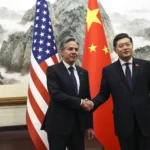EU member states on Wednesday adopted an eleventh round of sanctions against Russia. This new plan aims in particular to strengthen the measures already in place.
The Twenty-Seven agreed on Wednesday June 21 for an eleventh package of restrictive measures against Russia, after several weeks of negotiations. The European Union thus intends to fight against the circumvention of the sanctions already in place. A new tool of reprisals will thus be introduced against countries and companies that do not comply with the bans. The EU could impose restrictions on the export of goods and technologies that could fuel the Kremlin’s war machine.
The eleventh package thus targets refrigerators, printers, electronic calculators and other products, whose electronic chips are extracted to be reused in the Russian military-industrial complex, then used in Ukraine. The list has 155 pages. Measures against countries remain the last resort and the Union wants above all to be diplomatic. After discussions with Beijing, five companies accused of re-exporting sensitive goods to Russia have been removed from the list, but three companies based in Hong Kong, under Russian control, are still concerned.
Several states close to Moscow in the sights
Also in the sights, an Iranian company, two companies based in Uzbekistan, one in Armenia, one in Syria and two in the United Arab Emirates. The Gulf State has also become the new El Dorado and the place of refuge for Russian oligarchs, as shown by an investigation by L’Express.
Other measures adopted, vessels suspected of importing Russian petroleum products into Europe will be banned from entering EU ports and locks. The suspension of the broadcasting licenses in the Union of five Russian media under the control of the Kremlin is extended, as well as the ban on broadcasting their content. Also note the addition to the blacklist of 71 people and 33 entities involved in the deportation of Ukrainian children to Russia.
The text must be formally put in place this Friday, the names of the companies and individuals targeted will then be published in the “Official Journal of the EU”. Since February 2022 and the start of the war, the European Union has banned the export of more than 43.9 billion euros of goods to Russia, according to the Council of the organization. The decline in trade is drastic, but it has been characterized by increasingly strong compensation from countries close to Moscow, China, Turkey and the United Arab Emirates in the lead.
This article is originally published on lexpress.fr









